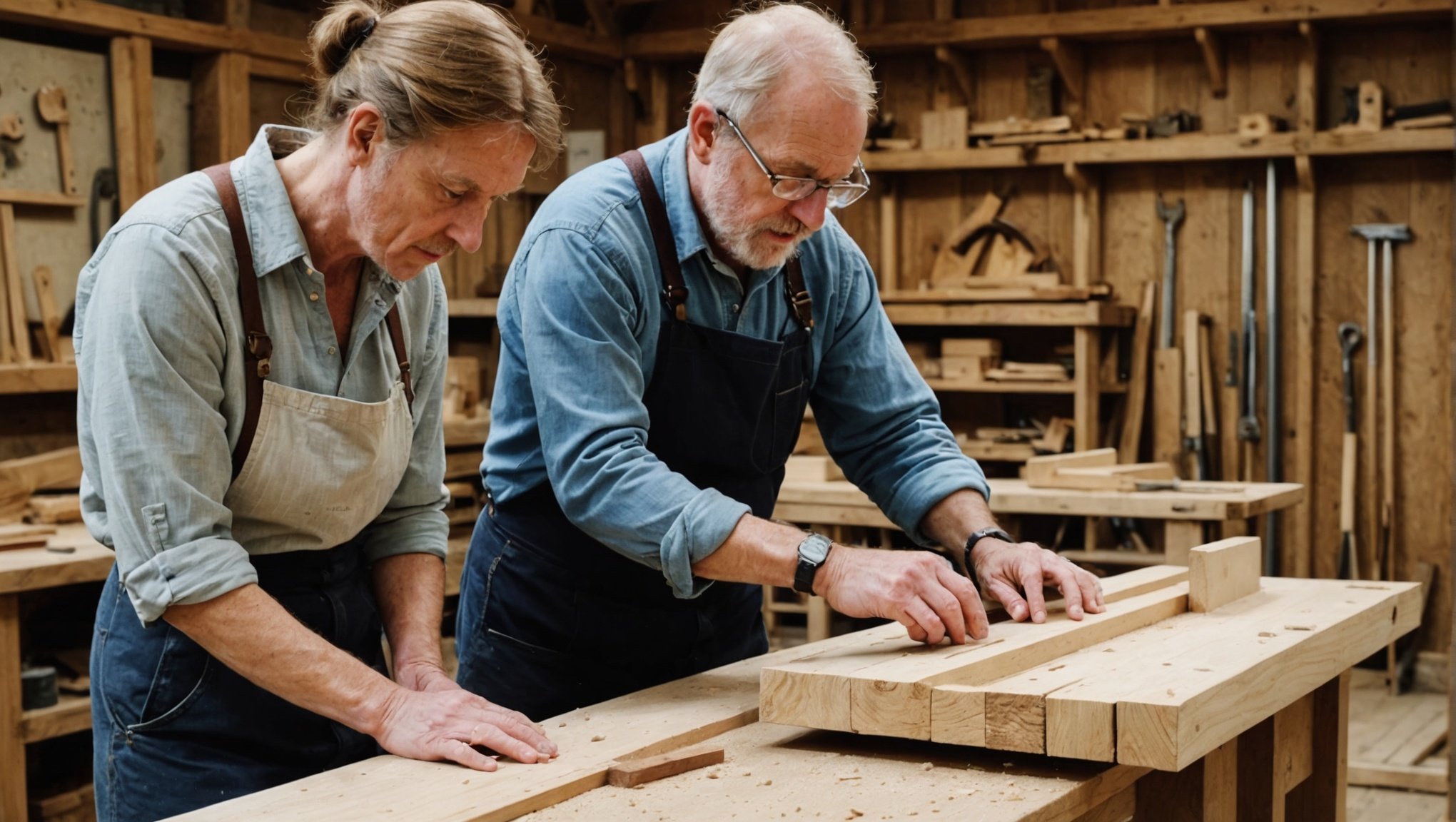Overview of British Carpentry
British carpentry stands as a testament to timeless craftsmanship, showcasing a rich cultural heritage steeped in history. Known for its historical significance, this art form has been integral to the country’s architectural evolution. Traditional techniques, carefully honed and passed through generations, remain central to British carpentry, ensuring that each structure emanates quality and elegance.
One of the hallmarks of British carpentry is its traditional techniques, such as dovetail joints and mortise and tenon, which reflect precision and strength. These methods have become a benchmark of excellence, enabling carpenters to create pieces that are both functional and aesthetically pleasing.
Have you seen this : Discovering Somerset: An Unforgettable Journey into the Rich World of British Cheese Tastings
In the realm of British carpentry, regional styles and materials play a pivotal role. Different areas of Britain offer unique woods like oak and ash, influencing the finished product’s appearance and durability. Each region contributes its flair, leading to a diverse and rich tapestry of styles across the nation. This influence is visible in structures ranging from quaint cottages to grand cathedrals, each infused with local charm and character.
By understanding these elements, one gains insight into a craft that encapsulates the spirit and traditions of Britain.
This might interest you : Embark on a Journey Through Time: Discovering Victorian Steam Engine Rides Across the UK for Tourists
Featured Workshops on Carpentry Techniques
If you’ve ever imagined building something from scratch with your own hands, these carpentry workshops offer a perfect opportunity. From novices to seasoned enthusiasts, there’s something for everyone to learn and love.
The hands-on experience you gain in these workshops is invaluable. Each session allows participants to create projects ranging from simple household items to more complex furniture pieces. This is facilitated by passionate, skilled instructors, each with a rich background in traditional carpentry methods. Their teaching doesn’t just cover techniques but also delves into the cultural relevance of each method, ensuring a comprehensive learning experience.
What sets these carpentry workshops apart is the unique immersion into time-honoured practices. In each session, participants get to grips with tools, learn precise techniques, and develop a deep appreciation for the intricacies involved in traditional carpentry. There’s a joy in seeing raw timber transform into something functional under your guidance, an experience that these workshops offer in spades.
Explore these workshops for a fulfilling and enriching experience, where learning is not just about the final product—it’s about the journey throughout your creative process. Embrace the art of carpentry and discover newfound skills to cherish.
Workshop Locations and Accessibility
Embarking on a journey to discover workshop locations for carpentry involves more than just selecting a venue. Let’s consider the rich variety of tourism accessibility factors enhancing your experience. Various sites across the globe offer proficient carpentry workshops, each with its unique appeal.
In terms of transportation options, many of these workshops are strategically placed near major cities or travel hubs. For instance, sites in London and Barcelona provide easy connections through their international airports and comprehensive public transit systems. This accessibility is crucial for tourists aiming to maximize their travel experience without logistical hassles.
While attending these workshops, there are numerous nearby attractions to explore which complement your learning. In London, the British Museum and the historic Tower of London offer cultural breaks from the workshop. Meanwhile, Barcelona boasts architectural wonders like the Sagrada Familia and Park Güell, enriching your travel experience beyond carpentry.
Therefore, the blend of well-situated workshop locations with ample tourism accessibility and notable attractions creates a holistic environment for both learning and leisure. This augments the value of your travel, providing an enriching backdrop to your carpentry venture.
Pricing and Scheduling Information
Understanding workshop pricing is crucial for planning your participation. Prices typically vary based on the type and duration of the workshop. Some workshops offer early bird discounts or group rates, which can be beneficial if you’re planning to attend with colleagues or friends.
In terms of scheduling details, workshops often have a seasonal schedule, aligning with specific times of the year to accommodate different needs. For instance, some workshops are more frequent during the summer holidays or around the end of the academic year, catering to students and professionals looking for development opportunities.
Booking information is straightforward but requires attention to detail. It typically involves selecting a suitable date from the available slots and confirming your spot by completing a registration form. Payment methods are diverse, ranging from online transactions to direct bank transfers, ensuring convenience for all participants.
Cancellation policies are essential to understand before signing up. Most workshops will provide a full refund up to a certain date, beyond which partial refunds or rescheduling options might be available. These policies protect both the organizer’s interests and provide flexibility for participants.
Skill Levels and Certifications
Navigating the world of carpentry workshops requires understanding the various skill levels and corresponding certifications. Whether you’re a beginner eager to learn the basics or an experienced carpenter seeking advanced techniques, knowing your starting point is crucial. Workshops often define clear skill levels to tailor the learning experience effectively.
Workshop Skill Levels
- Beginner Level: Ideal for participants with no prior exposure to carpentry. These workshops focus on foundational skills such as handling tools safely and executing simple projects.
- Intermediate Level: These are suited for individuals who have a grasp of the basics and wish to refine their technique, introducing more complex joinery methods and materials.
- Advanced Level: Designed for seasoned carpenters, these sessions dive into specialised techniques and intricate design work.
Certifications and Outcomes
Upon completion, participants typically receive certifications recognising their achievement and proficiency. These can range from basic competence certificates to advanced technical accreditations. Engaging in these workshops not only boosts skill levels but also enhances career prospects.
Understanding participant qualifications helps align individuals with the right workshop. Beginners are encouraged to start foundational courses before progressing, while advanced participants should seek programs that challenge and expand their expertise.
Testimonials and Participant Experiences
Experiences from participant testimonials offer a captivating glimpse into the essence of our workshops. A common theme emerges from the personal stories shared: these workshops are genuinely transformative.
Attendees frequently highlight their newfound clarity and motivation, both personally and professionally. Many have noted that the workshops did more than provide learning; they fostered a unique environment for personal reflection and growth. One participant stated that the experience was “like a fresh breeze of inspiration,” supplying them with tools to navigate their career with renewed vigour.
Workshop reviews often capture the atmosphere as both supportive and challenging, pushing attendees to step outside their comfort zones. Participants consistently appreciate the opportunity to connect with others, benefiting from shared experiences that lead to enriched understanding.
Moreover, the experiences shared emphasize the long-term effects attendees experience. Several participants recount how the workshops have significantly impacted their daily lives, providing new perspectives and actionable strategies for improvement.
These testimonials underscore the workshop’s significant effects on participants, validating the program’s approach to fostering development on multiple levels. The stories echo a powerful narrative of change, resilience, and innovation, demonstrating the workshops’ role in facilitating meaningful transformations.
Tips for Tourists Planning Visits
When you’re considering a workshop visit, these essential travel tips can make a significant difference in your overall experience. It’s crucial to plan your visit during the best times to maximise the workshops. Many destinations offer unique times for workshops, often aligning with local festivals or seasons.
For accommodations, researching ahead can uncover some hidden gems. Look for reviews and recommendations that offer insights into local dining options. These often provide a taste of regional cuisine and add an authentic touch to your travel experience.
Are you wondering about the best lodgings? Opt for places that are conveniently located near your workshop venue. This way, you save time on travel and potentially discover more of the area on foot. Being close to local dining and attractions allows for a more relaxed itinerary.
It’s also wise to bring along any materials or tools that might enhance your participation in the workshops. Checking beforehand on what will be provided allows you to prepare more effectively. Keep these travel tips and tourist advice in mind, and you’ll surely benefit from a more enriching visit.






